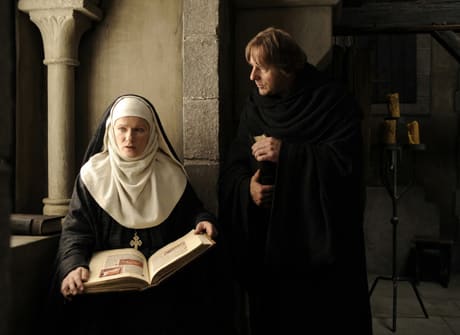Hildegard von Bingen (played by Barbara Sukowa), the writer, composer and noted visionary nun and elected magistra that founded two monasteries specifically for nuns in the early 12th Century, has been a topic of intrigue and curiosity in academic feminist circles of late. While often referring to women as the "weaker sex" and belittling their worldly contributions in written works, her seeming complacency made her assertions of receiving prophetic visions from God that much more plausible to Archbishops and Abbots. This assertion of divine vessel as a mode of elaborate manipulation drives Margarethe von Trotta's cold and formal portrayal of von Bingen's life and works in Vision. Offered to the church as a tithe at the (suspected) age of eight, she studied under the care of Jutta (Lena Stolze), bonding with Jutta's similarly aged namesake (Mareile Blendl). Very little of the film dwells on her childhood, instead focusing on her adulthood, engaging in heretical activity, such as thematic interpretation of biblical texts – something strictly forbidden for women – within the vacuum of spiritual visionary, wherein such pursuits could be allowed. This subtle and thematically intentional biopic is careful never to outright state von Bingen's motivations or disposition, instead juxtaposing her visions and requests with quotidian needs that she would be unable to propose to Abbot Kuno (Gerald Alexander Held) without the voice of God guiding her. When a sister nun is impregnated by a monk in the same monetary and subsequently kills herself, von Bingen asserts that the lord wants her and her sister nuns to form their own cloister in Rupertsberg. Usurping Kuno's authority after he rejects her proposal, she goes over his head to Archbishop Henry I to get her way, eventually (and conveniently) falling ill to force his hand. In addition to juxtaposing events to piece together likelihoods for the audience, von Trotta injects further hypocrisy into the film by making the famed nun somewhat of an egoist, at times, originally annoyed by the alacrity of Richardis (Hannah Herzsprung), a 16-year-old girl left in her care, until the child proves to be somewhat of a validating sycophant. There's also the issue of envy on the part of Jutta, whose judgemental gaze lingers in the periphery, given Hildegard's success and childhood favouritism. These quiet subversions add layered complexity to a narrative that works mainly through suggestion and restrained specificity. If the final product is somewhat cold, the historical and theological implications certainly compensate. Unfortunately, no supplements are included with the DVD.
(Mongrel Media)Vision
Margarethe von Trotta

BY Robert BellPublished Apr 6, 2011



